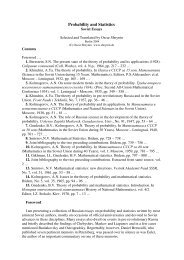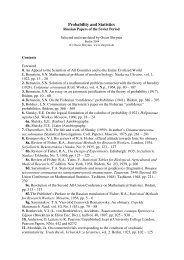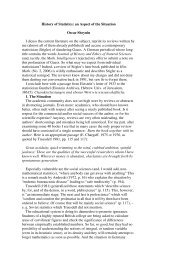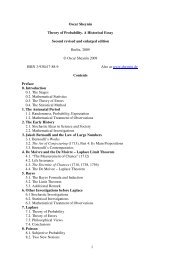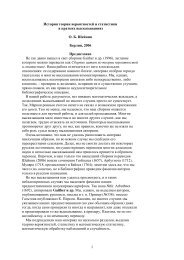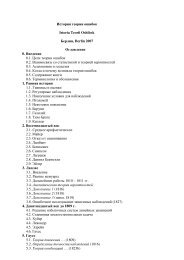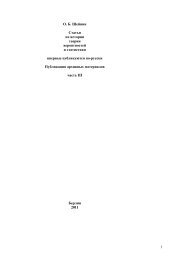n A1 /n 1 , n A2 /n 2 , ..., becom<strong>in</strong>g known after <strong>the</strong> trials. Quite admissible<strong>and</strong> practically useful is also <strong>the</strong> separation <strong>of</strong> <strong>the</strong> trials <strong>in</strong>to parts <strong>of</strong><strong>the</strong> collected material although <strong>in</strong> this case <strong>the</strong> problem <strong>of</strong> <strong>in</strong>tentionalor <strong>in</strong>tuitive arbitrary fit becomes acute.The dem<strong>and</strong> <strong>in</strong>dicated by Mises is important. Suppose that event Ais <strong>the</strong> production <strong>of</strong> defective articles whose probability P(A)experiences, say, seasonal fluctuations:P(A) = P t (A) = p 0 + p 1 s<strong>in</strong>(ωt + φ).Here t is <strong>the</strong> moment <strong>of</strong> observation, p 0 <strong>and</strong> p 1 are some constants suchthat P t (A) ≥ 0. Suppose that t = 1, 2, ..., n. It is not difficult to showthat, for <strong>in</strong>dependent results <strong>of</strong> observation at those moments <strong>the</strong> ration A /n will tend to p 0 (if only ω ≠ 2π). At <strong>the</strong> same time <strong>the</strong> separationaccord<strong>in</strong>g to <strong>the</strong> seasons if <strong>the</strong> seasonal fluctuations really exist willshow that Mises’ dem<strong>and</strong> is violated. The knowledge that suchfluctuations exist can be practically very important.Here, however, a very complicated question emerges: suppose thatwe did not know whe<strong>the</strong>r seasonal fluctuations existed. How couldhave we suspected that <strong>the</strong> data should be separated accord<strong>in</strong>g to <strong>the</strong>seasons? And, on <strong>the</strong> whole, is <strong>the</strong>re any general method for choos<strong>in</strong>g<strong>the</strong> separate groups or should we test all possible groups? We can onlysay that such general method does not exist <strong>and</strong> that it is obviouslysenseless to test all possible groups because, whatever is <strong>the</strong> situation,a certa<strong>in</strong> group can conta<strong>in</strong> all <strong>the</strong> occurrences <strong>of</strong> <strong>the</strong> event A, <strong>and</strong>ano<strong>the</strong>r one, none <strong>of</strong> <strong>the</strong>m so that <strong>the</strong> equality <strong>of</strong> <strong>the</strong> frequencies willbe violated as much as possible. The researcher chooses <strong>the</strong> groups<strong>in</strong>tuitively or bases his choice on <strong>the</strong> available pert<strong>in</strong>ent <strong>in</strong>formation.Then, we wish to discuss ano<strong>the</strong>r problem: suppose that <strong>the</strong> Misesdem<strong>and</strong>s are fulfilled, will that be sufficient for apply<strong>in</strong>g stochasticmethods? In o<strong>the</strong>r words, are those dem<strong>and</strong>s not only necessary, butalso sufficient? Hav<strong>in</strong>g such a general problem, we can only discusssome versions <strong>of</strong> a ma<strong>the</strong>matical <strong>the</strong>orem establish<strong>in</strong>g, say, that, giventhat <strong>the</strong> Mises conditions are fulfilled, some proposition is true, forexample <strong>the</strong> law <strong>of</strong> large numbers.Here, however, <strong>the</strong> same question emerges: how are we to choose<strong>the</strong> groups <strong>of</strong> observations? When admitt<strong>in</strong>g all possible groups such adem<strong>and</strong> will be contradictory, hence can not underlie a ma<strong>the</strong>maticalpro<strong>of</strong>. If not all possible, <strong>the</strong>n it ought to be stated which groups, <strong>and</strong>this is difficult.We see that once we only beg<strong>in</strong> th<strong>in</strong>k<strong>in</strong>g about <strong>the</strong> simplest problemconcern<strong>in</strong>g <strong>the</strong> possible presence <strong>of</strong> seasonal fluctuations <strong>of</strong> <strong>the</strong>probability <strong>of</strong> produc<strong>in</strong>g defective articles, let alone proceed to<strong>in</strong>vestigate it, we conclude that available general scientificprescriptions are obviously <strong>in</strong>sufficient for solv<strong>in</strong>g a given concreteproblem. I do not know even a s<strong>in</strong>gle exception from this rule. It doesnot, however, follow that no practical problem can be solved at all, seebelow, but I note now that <strong>in</strong> spite <strong>of</strong> all <strong>the</strong> shortcom<strong>in</strong>gs <strong>of</strong> thatconcept, it still establishes absolutely clearly that some restrictions <strong>of</strong><strong>the</strong> sphere <strong>of</strong> <strong>the</strong> application <strong>of</strong> statistical methods are necessary.94
In <strong>the</strong> purely scientific sense this conclusion is not at all new. Wesaw how careful was Laplace concern<strong>in</strong>g those stochastic applicationswhere <strong>in</strong>deed such carefulness was needed. Poisson, although hiscontribution on <strong>the</strong> probabilities <strong>of</strong> judicial verdicts was wrong on <strong>the</strong>whole 11 , perfectly well understood <strong>the</strong> need to verify a number <strong>of</strong>assumptions by factual materials <strong>and</strong> performed some checksobta<strong>in</strong><strong>in</strong>g an excellent fit [i]. And <strong>in</strong> general <strong>the</strong>re was likely noresearcher who did not somehow choose to solve such problems where<strong>the</strong> application <strong>of</strong> <strong>the</strong> <strong>the</strong>ory <strong>of</strong> probability could have provedeffective.So <strong>the</strong> discussion can only concern methodical problems (methods<strong>of</strong> teach<strong>in</strong>g). What should be <strong>in</strong>cluded <strong>in</strong> textbooks <strong>in</strong>tended forbeg<strong>in</strong>ners, or <strong>in</strong> a paper designed for be<strong>in</strong>g widely debated? Suchconsiderations lead to a special k<strong>in</strong>d <strong>of</strong> reason<strong>in</strong>g that I am <strong>in</strong>deedcall<strong>in</strong>g speculative criticism <strong>of</strong> <strong>the</strong> <strong>the</strong>ory <strong>of</strong> probability.A student, beg<strong>in</strong>n<strong>in</strong>g to study a subject usually does not master anyconcrete material. This concerns not only students <strong>of</strong> purelyma<strong>the</strong>matical specialities for which <strong>the</strong> curriculum does not envisageany such material, but also those follow<strong>in</strong>g applied specialities whostudy <strong>the</strong> <strong>the</strong>ory <strong>of</strong> probabilities (toge<strong>the</strong>r with all <strong>the</strong>oreticaldiscipl<strong>in</strong>es) dur<strong>in</strong>g <strong>the</strong>ir first years <strong>of</strong> learn<strong>in</strong>g. If, however, weconsider a paper discuss<strong>in</strong>g problems <strong>of</strong> pr<strong>in</strong>ciple, it is addressed topeople who are mostly acqua<strong>in</strong>ted with factual materials, althoughdifferent from one <strong>of</strong> <strong>the</strong>m to ano<strong>the</strong>r. This is <strong>in</strong>deed what dem<strong>and</strong>s aspeculative discussion <strong>of</strong> <strong>the</strong> problem.Such discussions are based on a s<strong>in</strong>gle pr<strong>in</strong>ciple: s<strong>in</strong>ce <strong>the</strong> necessity<strong>of</strong> restrictions <strong>in</strong> applications <strong>of</strong> <strong>the</strong> <strong>the</strong>ory <strong>of</strong> probability isacknowledged, let us see whe<strong>the</strong>r we are able to verify <strong>the</strong>ir realization<strong>in</strong> practice. It is easily established that <strong>the</strong> restrictions are generallyformulated too <strong>in</strong>def<strong>in</strong>itely, <strong>and</strong> if desir<strong>in</strong>g to check <strong>the</strong> conclusionsra<strong>the</strong>r than <strong>the</strong> restrictions, we f<strong>in</strong>d that an exhaust<strong>in</strong>g verification ishere also impossible.Pert<strong>in</strong>ent examples can be seen <strong>in</strong> [i] <strong>and</strong> Tutubal<strong>in</strong> (1972).However, some contributions <strong>of</strong> Alimov have become recently known.His style is very vivid, <strong>and</strong> many quotations <strong>of</strong> his statements isdesirable, but we have to choose only one (1974, p. 21):Thus, <strong>the</strong> correctness <strong>of</strong> compar<strong>in</strong>g n measurements with n<strong>in</strong>dependent r<strong>and</strong>om variables is not threatened by any experimentalcheck. Follow<strong>in</strong>g an established tradition, such comparisons areassumed as a basis <strong>of</strong> many branches <strong>of</strong> ma<strong>the</strong>matical statistics, <strong>of</strong> <strong>the</strong><strong>the</strong>ory <strong>of</strong> Monte Carlo methods, r<strong>and</strong>om search<strong>in</strong>g, rationalization <strong>of</strong>experiments <strong>and</strong> a number <strong>of</strong> o<strong>the</strong>r apparently serious discipl<strong>in</strong>es.Be<strong>in</strong>g impossible to check experimentally, <strong>the</strong>y are significantly, so tosay, present at <strong>the</strong> development <strong>of</strong> systems <strong>of</strong> automatic control.Here, Alimov bears <strong>in</strong> m<strong>in</strong>d that, hav<strong>in</strong>g one sample, it is impossibleto verify ei<strong>the</strong>r <strong>the</strong> <strong>in</strong>dependence <strong>of</strong> separate observations or <strong>the</strong>co<strong>in</strong>cidence <strong>of</strong> <strong>the</strong>ir laws <strong>of</strong> distribution. In general, imag<strong>in</strong><strong>in</strong>g anensemble <strong>of</strong> many possible samples given one really observable, is forhim <strong>in</strong>admissible. Accord<strong>in</strong>gly, he proposes to ab<strong>and</strong>on <strong>the</strong> ma<strong>in</strong>95
- Page 1 and 2:
Studies in the History of Statistic
- Page 3 and 4:
Introduction by CompilerI am presen
- Page 5 and 6:
(Lect. Notes Math., No. 1021, 1983,
- Page 7 and 8:
sufficiently securely that a carefu
- Page 9 and 10:
is energy?) from chapter 4 of Feynm
- Page 11 and 12:
demand to apply transfinite numbers
- Page 13 and 14:
for stating that Ω consists of ele
- Page 15 and 16:
chances to draw a more suitable apa
- Page 17 and 18:
Let the space of elementary events
- Page 19 and 20:
2.3. Independence. When desiring to
- Page 21 and 22:
Eξ = ∑ aipi.Our form of definiti
- Page 23 and 24:
absolutely precisely if the pertine
- Page 25 and 26:
where x is any real number. If dens
- Page 27 and 28:
probability can be coupled with an
- Page 29 and 30:
Nowadays we are sure that no indepe
- Page 31 and 32:
λ = λ(T)with λ(T) being actually
- Page 33 and 34:
(1/B n )(m − A n )instead of the
- Page 35 and 36:
along with ξ. For example, if ξ i
- Page 37 and 38:
µ( − p0) ÷np0 (1 − p0)nhas an
- Page 39 and 40:
distribution of the maximal term |s
- Page 41 and 42:
ξ (ω) + ... + ξ (ω)n1n{ω :|
- Page 43 and 44: P{max ξ(t) ≥ x} = 0.01, 0 ≤ t
- Page 45 and 46: 1. This example and considerations
- Page 47 and 48: IIV. N. TutubalinTreatment of Obser
- Page 49 and 50: structure of statistical methods, d
- Page 51 and 52: Suppose that we have adopted the pa
- Page 53 and 54: and the variances are inversely pro
- Page 55 and 56: It is interesting therefore to see
- Page 57 and 58: is applied with P(t) being a polyno
- Page 59 and 60: ut some mathematical tricks describ
- Page 61 and 62: It is clear therefore that no speci
- Page 63 and 64: of various groups of machines, and
- Page 65 and 66: nnA(λ) x sin λ t, B(λ) = x cosλ
- Page 67 and 68: of the mathematical model of the Br
- Page 69 and 70: dF(λ) = f (λ) dλ, so that B( t
- Page 71 and 72: usually very little of them. Indeed
- Page 73 and 74: This is the celebrated model of aut
- Page 75 and 76: applications of the theory of stoch
- Page 77 and 78: achieved by differentiating because
- Page 79 and 80: u(x 1 , x 2 , t 1 , t 2 ) = v(x 1 ,
- Page 81 and 82: Reasoning based on common sense and
- Page 83 and 84: answering that question is extremel
- Page 85 and 86: IIIV. N. TutubalinThe Boundaries of
- Page 87 and 88: periodograms. It occurred that work
- Page 89 and 90: at point x = 1. However, preceding
- Page 91 and 92: He concludes that since the action
- Page 93: The verification of the truth of a
- Page 97 and 98: ought to learn at once the simple t
- Page 99 and 100: the material world science had inde
- Page 101 and 102: values of (2.1) realized in the n e
- Page 103 and 104: *several dozen. The totality µ ica
- Page 105 and 106: Mendelian laws. It is not sufficien
- Page 107 and 108: example, the problem of the objecti
- Page 109 and 110: a linear function is not restricted
- Page 111 and 112: 258 - 82 - 176 cases or 68.5% of al
- Page 113 and 114: The Framingham investigation indeed
- Page 115 and 116: or, for discrete observations,IT(ω
- Page 117 and 118: What objections can be made? First,
- Page 119 and 120: eliability and queuing are known to
- Page 121 and 122: Kolman E. (1939 Russian), Perversio
- Page 123 and 124: measurement is provided. Recently,
- Page 125 and 126: which means that sooner or later th
- Page 127 and 128: The foundations of the Mises approa
- Page 129 and 130: A rather subtle arsenal is develope
- Page 131 and 132: 4.3. General remarks on §§ 4.1 an
- Page 133 and 134: BibliographyAlimov Yu. I. (1976, 19
- Page 135 and 136: processes are now going on in the s
- Page 137 and 138: obtaining a deviation from the theo
- Page 139 and 140: VIOscar SheyninOn the Bernoulli Law



